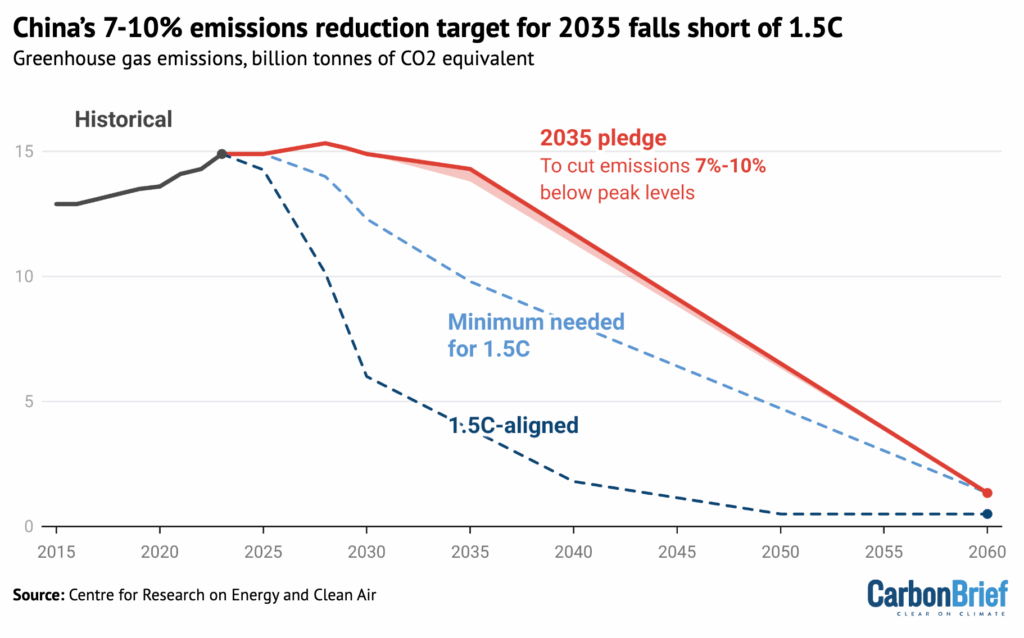
DeBriefed 26 September 2025: China leads new climate pledges; Trump calls warming a ‘con job’; What comes next
Simon Evans
09.26.25Simon Evans
26.09.2025 | 2:16pmWelcome to Carbon Brief’s DeBriefed.
An essential guide to the week’s key developments relating to climate change.
This week
China’s new climate pledge
GUTERRES DEMANDS: UN secretary general António Guterres hosted a special climate action summit in New York on Wednesday, the Associated Press reported, alongside the closing day of the UN general assembly. It added that at the “marathon session”, where 121 world leaders were scheduled to speak, Guterres said: “The science demands action. The law commands it. The economics compel it. And people are calling for it.”
CHINA CUTS: First billing went to President Xi Jinping, who unexpectedly appeared via video to announce a target of cutting emissions – from all greenhouse gases and across China’s entire economy – to 7-10% below peak levels by 2035, according to Bloomberg. This is a significant moment for global climate efforts, noted BBC News, as it is the first time that China has pledged to reduce its emissions in absolute terms.
CAUTIOUS RESPONSE: However, the pledge fell short of the “at least 30%” cut observers had said was needed, BBC News added. Carbon Brief has published a detailed Q&A on China’s new climate pledge and will host a free webinar on the topic. Sign up for free.
PLEDGE CONFUSION: The Guardian said “120 countries and the EU announced new goals” at the summit. However, Carbon Brief analysis of the speeches and official submissions found that only 11 countries offered new targets. Following the summit, countries representing half of global emissions have now announced or submitted their 2035 climate pledges, according to analysis just published by Carbon Brief.
Trump’s new climate sledge
‘CLIMATE CON’: The day before the Guterres summit, Donald Trump had used a nearly hour-long speech to the UN general assembly to deliver what the Bloomberg Green newsletter called a “blizzard” of “climate misinformation”. He attracted blanket coverage – and multiple factchecks – for false claims including that climate change was the “greatest con job ever” and that warming predictions were “wrong”.
FACTCHECK: Contrary to Trump’s claims, human-induced warming is an “established fact”, according to the IPCC, as is an increase in the strength and frequency of extreme weather events. Regarding climate models, Carbon Brief climate science contributor Dr Zeke Hausfather noted on Bluesky that projections of warming have been “pretty spot on”.
Around the world
- RENEWABLE RECORD: Global investment in renewable energy grew 10% year-on-year to a record $386bn in the first half of 2025, the Guardian said.
- CARBON CLUB: COP30 host Brazil is “trying to build a coalition of countries, including the EU and China, to unify carbon markets”, Bloomberg reported.
- FOSSILS OUT?: Colombia will host the first-ever international conference on phasing out fossil fuels in 2026, according to Climate Home News. Meanwhile, E&E News covered the latest UN “production gap” report saying, despite a COP28 pledge to transition away from fossil fuels, “many are planning for even more production”.
- SUPER TYPHOON: Ragasa, a category 5 “super typhoon” and the world’s most powerful tropical cyclone this year, killed 17 people in Taiwan, BBC News said. The storm, which was “intensified” by climate change according to the Hong Kong Free Press, caused nearly two million residents to be evacuated in China, added Xinhua,
- DEFORESTATION DELAY: The EU has delayed the start of its anti-deforestation law “by another year”, Reuters said, blaming “IT system concerns”.
- AIRPORT APPROVAL: The UK government approved a second runway at London’s Gatwick airport, said BBC News. The Sunday Times reported that it was also “poised to soften” its ban on new drilling in the North Sea.
62,700
The number of deaths in Europe linked to heat-related causes in 2024, the continent’s hottest year on record, according to new research covered by Reuters.
Latest climate research
- Extreme and “unprecedented” global water-scarcity events – or “day-zero droughts” – could happen in the 2020s and 2030s | Nature Communications
- The drying of the Ganga river, of great economic and cultural importance to millions of people in India, Nepal and Bangladesh, is “unprecedented in the last 1,300 years” | Proceedings of the National Academy of Sciences
- The likelihood of “severe bushfires danger” in Australia driven by a positive Indian Ocean Dipole has increased by 16-32% due to climate change | Journal of Geophysical Research: Atmospheres
(For more, see Carbon Brief’s in-depth daily summaries of the top climate news stories on Monday, Tuesday, Wednesday, Thursday and Friday.)
Captured

China’s new climate pledge, outlined by President Xi Jinping, includes a target to reduce “economy-wide net greenhouse gas emissions” to 7-10% below peak levels by 2035. But, as Carbon Brief explained in a detailed Q&A, this falls short of what would have been needed to contribute to limiting warming to 1.5C, according to experts.
Spotlight
Can COP30 respond to the 1.5C challenge?
With hopes fading of keeping global warming below 1.5C, despite new pledges at a UN summit in New York, this spotlight looks at the road to COP30 in Brazil and how the climate talks might respond.
After 2024 marked the hottest year on record and the first above 1.5C, 2025 was supposed to offer a chance to “course correct” through new, more ambitious national climate plans.
Instead, many countries have missed repeated deadlines for updated “nationally determined contributions” (NDCs) under the Paris Agreement, setting out their plans to 2035.
Despite some new pledges in New York this week – including from China – collective efforts still “fall short” of limiting warming to the Paris goals of “well-below” 2C while “pursuing efforts” towards 1.5C.
Drumbeat of ‘disappointment’
This message is likely to be reinforced by a UN “synthesis report”, compiling the impact of new NDCs and due to be published on 24 October.
It will likely be reiterated in early November by the UN’s annual “emissions gap” report. Last year’s report had called for a “quantum leap” in ambition, which has yet to materialise.
This is all despite an advisory opinion from the International Court of Justice in July, which said that 1.5C should be considered the “primary temperature goal” of global climate efforts – and that countries should make “adequate contributions” towards meeting it.
Meanwhile, amid oil and gas advocacy from the Trump administration, debate is raging over whether fossil fuels have peaked – and whether climate efforts need a “pragmatic” reset.
This is set to culminate with a battle to control the narrative around the International Energy Agency (IEA) World Energy Outlook for 2025, also due in early November.
Avantika Goswami, programme manager for climate change at India’s Centre for Science and Environment, told Carbon Brief that the global climate regime was at a “turning point”, where agreements had been signed and targets set, but action was “stalling”. She said:
“Implementation is weak, finance is undelivered and trust in the UN system is eroding, amid trade wars, militarism, debt crises and fractured multilateralism.”
Can COP30 respond?
Just days after the raft of new reports, on 6-7 November, heads of state and government will gather in the Brazilian city of Belém for a leaders summit ahead of the COP30 climate talks.
Views differ on how COP30 should respond to the current challenges.
The Brazilian presidency is pushing for a formal COP decision on any “disappoint[ment]” over NDCs falling short, collectively, of what is needed to avoid dangerous global warming.
During initial consultations, the EU said it wanted climate ambition to be added to the COP agenda, while the groups of least developed countries (LDCs), small island states and Latin American countries supported a formal COP decision on the matter. Others pushed back.
Catherine Abreu, director of the International Climate Politics Hub, told Carbon Brief that COP30 would need to respond in some way. She said:
“It’s clear that credibility at COP30 will require a response to the fact that countries’ climate pledges don’t add up to the level of ambition needed to tackle the crisis. The question after this week is, how will the COP outcomes enrich our definition of ambition beyond a headline emissions reduction goal?”
Abreu added that COP30 would need to address barriers, including “the equitable finance needed to implement goals and a lagging transition away from fossil fuels”.
Amid frustration over slow progress, calls for reform of the COP process are getting louder.
Goswami concluded: “The needs and ambitions of the global south must now shape the climate narrative – and COP30 must reckon with this new balance of power.”
Watch, read, listen
GAME OVER?: A feature in the Wall Street Journal said that, as Trump “doubles down on fossil fuels”, the US is “forfeiting the clean-energy race to China”.
POPULIST PUSHBACK: The Drilled podcast talked to a sociologist and a political scientist about “the intersection between the rise of rightwing populism and increasing resistance to acting on climate”.
ADULTS ONLY: For the New York Times, the Asia Society Policy Institute’s Li Shuo wrote that China was “the adult in the room on climate now”, despite its “modest” new pledge.
Coming up
- 22-26 September: Fifth world congress of biosphere reserves, Hangzhou, China
- 27 September: Seychelles elections
- 28 September: Moldova elections
- 30 September-1 October: 42nd UN water meeting, Geneva, Switzerland
Pick of the jobs
- Indigenous Climate Action, research coordinator | Salary: $55,000-$68,000. Location: Remote
- Greater London Authority, head of climate change | Salary: £91,268. Location: London
- Stockholm Environment Institute, research fellow: climate impact and climate finance | Salary: Unknown. Location: Nairobi, Kenya
DeBriefed is edited by Daisy Dunne. Please send any tips or feedback to [email protected].
This is an online version of Carbon Brief’s weekly DeBriefed email newsletter. Subscribe for free here.



